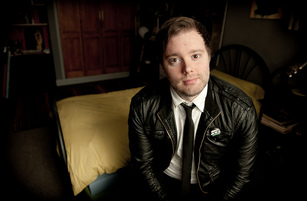
Fresh from two BAFTA wins earlier this year; BBC Three’s zombie drama In the Flesh has recently concluded its second series. But with the future of BBC Three still up in the air, what’s next for this fantastic show itself is still a bit of a mystery. Hayley Charlesworth chatted to show creator and head writer Dominic Mitchell about what’s next for Kieren Walker and co, the issues the show tackles, and getting your first commission as a writer.
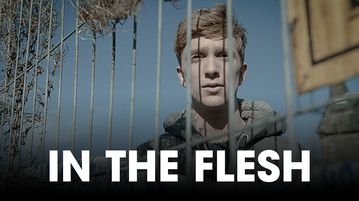
We just don’t know is the honest answer. Just because BBC Three is in a transitional phase, so they’re still kind of figuring out the drama budget for next year. So there’s no news, unfortunately. You know as much as me, everyone is in the dark, unfortunately. Of course, we’d love to do more, me, Hilary Martin (Executive Producer), the cast, we all want to do more. But it’s up to the BBC. Once the BBC figures out what the BBC Three online channel is going to be, if it’s gonna go online as well, I think that’s the question. I think that’s why it’s taking so long for a decision to be made because they’re sort of in a bit of a limbo themselves. I’d like to, I’d really like to, of course, but we just don’t know.
Have you considered, if the BBC didn’t recommission for a new series, other avenues for In the Flesh, such as a graphic novel, a book, or taking the show to another channel?
I’d be interested in maybe finding another home for it. I love graphic novels, and I love books, but I think I’d feel a bit weird doing it without the cast, and everyone else like Hilary Martin, Simon Judd (Development Executive), the fantastic directors we’ve got. Even though it is my creation and I wrote most of the episodes, it’s not just me who brings it to life. I can’t imagine not working with Luke (Newberry) being Kieren, or Emily (Bevan) not being Amy. If that did happen, I’d like to find a home for it, but a graphic novel I think would be a bit selfish of me, in a weird way. I love working with Luke, Emily and Hilary, and all the cast and crew, so I would miss that, and it would be sad not to do it with them.
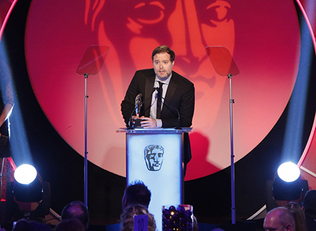
I’ve been kind of surprised, because we are a little show on a cable channel, we’re not Game of Thrones, we’re a little zombie show on BBC Three. To have that support is immense and incredible. I think they take that into consideration, it’s just that the BBC are at such a crossroads, but they do realise that. BBC Drama have been so supportive, like Ben Stephenson, who is the Head of Drama here. He’s been fantastically supportive, and has always been a relentless champion of it. The whole show is a niche show; it’s never gonna be a massive mainstream hit, I don’t think, with some of the issues that we bring up, and because in a lot of ways it’s a strange show. It’s not like The Walking Dead, which is kind of mainstream. But the support has been amazing, I’ve been shocked. Pleasantly shocked.
It does seem like the cast are very behind the show. Emmett Scanlan (Simon) for example has been retweeting all this fantastic fanart as well as your own Twitter.
That’s what’s been so great about working on In the Flesh, is that all the cast members, the new cast members, crew, the fantastic directors like Jim O’Hanlon, Damian Thomas, Jonny Campbell, Alice Troughton, they’ve all come on board as fans of the show, so that’s been fantastic. It has felt like a big family. A zombie family. Everyone’s raring to go, and I think that passion is great, and it’s needed in a cult show. Emmett’s been fantastic tweeting all this stuff and he’s always asking me “when’s there gonna be a third series?” and “what’s gonna happen to my character?”
You mentioned earlier about some of the issues In the Flesh brings up limiting the mainstream appeal, which is not necessarily a bad thing. One of best examples of that, I think, is the representation of sexuality. There’s Simon and Rick, but with Kieren in particular. I don’t know if Kieren has a label, but many fans interpret him as pansexual, which outside of characters like Torchwood’s Captain Jack Harkness, is something we’ve never really seen on television before.
Because the show is in a lot of ways about labels, Kieren is called a lot of things: a Partially Deceased Syndrome Sufferer, The First Risen, an Angel of Heaven, a Rotter, a Dead ‘Un. There are all these labels that people put on him, and it’s the same in life as well. People like to put others in boxes. So I kind of wanted Kieren’s sexuality to be that he falls in love with the person. Obviously he’s attracted to men, I think he’s attracted to women too. He’s attracted to their personality, and I quite like that, rather than “oh yes, he’s a gay zombie”. I didn’t want it to be a big deal. I know a lot of shows that deal with these sorts of issues; they make it the centrepiece of the character, that’s their only facet. It’s only once facet of Kieren, he’s got bigger fish to fry. There are bigger issues at hand than dealing with his sexuality. He’s quite comfortable with that, it’s being a zombie that he has trouble with.
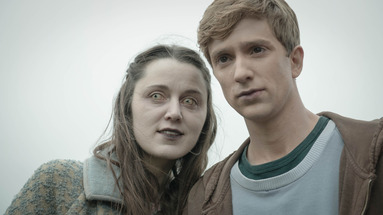
It’s quite nice to see someone like Kieren. He’s not your typical Superman. He is strong, and brave, but he’s also emotional and sensitive. I like that he’s not completely macho, not just kicking people’s arse and taking names.
Was there a conscious decision, as you were writing, to draw parallels between PDS sufferers and their treatment, and the treatment of mental health conditions?
In the Flesh wasn’t about zombies in the beginning stages. It was about a young lad who has a psychotic episode, does something very bad in his community, is sectioned, treated, and then he has to come back into society. I was getting stuck on it because it seemed quite on the nose and preachy. I have always been a massive zombie fan so when I was watching a zombie movie one time, I started sympathising with the zombie characters because the human characters were so unlikable. I was thinking “surely you don’t have to shoot them in the head, it’s not their fault. They’re in a primitive state; they don’t know what they’re doing.” And when I thought maybe you could medicate them, that’s when those two ideas merged. I thought I could talk about all the issues like feeling different, and that something is inherently wrong with you and you need to be fixed, and a lot of the ways that people with mental illness feel, and I could say it in a more left-field, entertaining way.
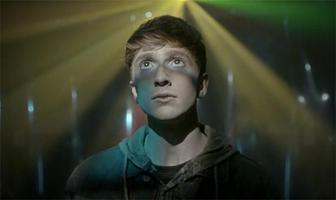
The second series is about belief, that was our big theme. That was our thought in the writer’s room: belief, and how belief in yourself can make you or disbelief in yourself can be a disaster. Belief in certain ideologies can be a disaster as well. It wasn’t about a certain organised religion, but ideology, I think, or an immovable ideology which the Undead Prophet has, is always gonna mess people up. The Undead Liberation Army is a death cult in a lot of ways. I never saw Simon as that strong. He was a follower, he was a guy who needed people to love and accept him, and he would do anything for that.
I think that’s where a lot of extremist groups get their followers. They get them from people needing to belong and needing to be accepted. That’s the same with gangs. You get a lot of gang members saying “why was I in this gang? Because they accepted me and they showed me love.” That’s sort of what Simon goes through, but it’s not unconditional love, it is conditional love. It’s them saying “I’ll accept you if you do this for me, if you kill this person.” That was our main goal going in, looking at belief, and looking at different types of belief. Believing in yourself is a very good thing, it’s a very empowering thing, and believing in an ideology or a creed that you can’t argue against is a bad thing.
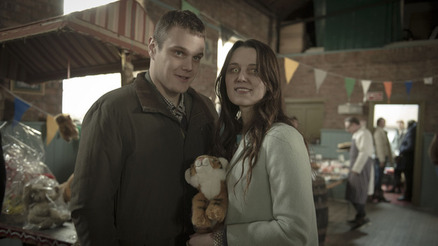
I haven’t thought that far ahead, to be honest. When we did that backstory for Simon, I felt it was important that we knew where he was coming from, because if we didn’t do that flashback episode and we saw him just picking up that knife and going “yeah, I’m gonna kill Kieren”, I think he would become an antagonist and an enemy in the audience’s eyes, and I wanted the audience to understand why he was even considering doing this. I hope that was the accomplishment of that episode, and that the audience feel sorry for him. He’s been kicked out by his family, and he has no-one else except the Undead Prophet.
Flashbacks can work and they can’t work. I would be wary about showing the Rising, because the show is about what happened afterwards, and some things are best left to the imagination. I know how Jem got recruited to the HVF, but your version might be better than my version. Showing it sometimes dispels that magic. I would be wary about doing a flashback episode to the Rising because we couldn’t do it justice, and that’s why this show is interesting, because you always see them coming out of their graves and the show wanted to rebel against that. We wanted to see what happened after that, I’m always interested in what came afterwards.
I know many people who aren’t huge fans of the zombie genre have enjoyed In the Flesh because it’s so different and the focus is elsewhere. It is a very unique premise in terms of zombie fiction.
I think if we showed the Rising then it would become an episode of The Walking Dead. I love The Walking Dead, but In the Flesh is a different show. We’d have to have all the action sequences, and it would be an exciting episode to write, but I think it would just give the game away too much. It would become too action packed and too like a normal zombie show, which we’re trying to fight against.
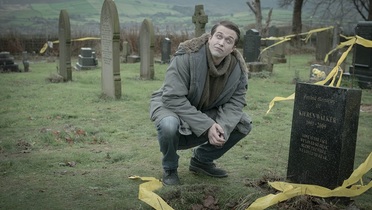
A flashback is an interesting tool, but it’s a tool that you’ve got to be really careful with. You can overuse it, and it can become a lazy shorthand to show what happened before. The whole thing that we wanted to do with In the Flesh is that there are no good guys and bad guys, just like in life. Gary considers himself a hero, and he thinks that he’s a forgotten hero, and of course he’s bitter about that. And you would be. He’s fought in this war, he’s saved his community, and he’s thinking “I was really scared in that first mission.” But he overcame his fear and did his duty, and now he can’t get a job. So I feel for Gary.
Even with Maxine, who is the antagonist. Everyone has their own reasons. Maxine isn’t just killing Amy because she thinks PDS sufferers are bad, she’s killing Amy because she believes in a crazy prophecy, and she’s doing it for her brother. Jem didn’t kill her brother when he was in a rabid state, when she should have. Kieren was rabid and at that time they didn’t have a cure. It’s endlessly fascinating when the enemy stops becoming the enemy. There’s always going to be wars, and ceasefires, and a peace process. It’s how you get on after the war that is the question. It’s easy to hate someone, but it’s much, much harder to accept them, or even love them.
Everyone’s questioning what happened to Amy. Do you have a plan of what’s going to happen to her, and if the same thing would happen to other PDS sufferers?
The last scene is them digging Amy up, so there has to be something about Amy that is special. They wouldn’t come to Roarton and dig her up if there wasn’t something special about her. In my mind, she is the First Risen. In other TV shows, it’s always the protagonist who has got to have some special power, and I think Kieren is special but in a very normal way. His character is trying to live his life and not do any harm, and I think that is kind of special. And there’s the idea of, is that prophecy about the First Risen even a correct belief, or is that just a rumour? Does it matter who the First Risen is? Amy is very special to Halpern and Weston, because they wouldn’t go to the trouble of digging her up if she wasn’t special. What happens to her, I can’t say. I don’t want to spoil anything.
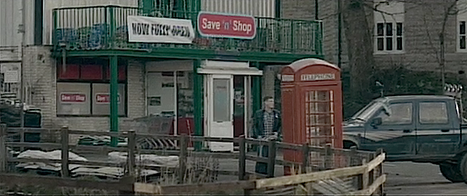
I’m from a little village in Lancashire, not Roarton because that’s made up, but I used some of my experience of growing up in a Lancashire village. I was the Kieren character, I was the black sheep. I was making mix CDs and being a bit alternative. I know that world a lot. It’s a heightened representation of where I grew up. I have to say to people “my village isn’t Roarton, you’re not gonna be shot in the face for being different.” When I was growing up, although hopefully it’s changed, if you were different in any way and not part of the pack, people would segregate you. That was my experience growing up in my village. I was banned from friends and told I was a bad lad, when I wasn’t, I was just interested in the wider world and not into mainstream stuff, and that made me a threat. So I can see where Kieren is coming from when he was getting banned from Rick and from everyone else.
My village was the kind of place that read all the tabloids and believed them, believed the threat. That’s the thing with these little cut-off places. They get rumours second hand and believe them, panic about them. That’s not just here, you see it in small towns in America. They believe sensationalism and panic. Like in the show, when the woman is giving out leaflets about rabification. Even with Victus, who are a right-wing party, there is some truth about them. When Maxine says “they’re only a dose away from ripping your head apart”, that’s true. We saw that when Freddie missed a dose of his medication. With any of these parties, they get what they want by taking seeds of truth and sensationalising them and preying on our fears, capitalising on the rumours. Which Maxine did, when she said poor Henry had gone to a ULA training camp. Which is ridiculous, he’s a teenage boy, but she can get away with that because at that time in Roarton, everyone was getting fearful about ULA attacks, and she manipulated that truth to her own end.
But yeah, you were talking about Lancashire! I love it, it’s not a hate letter to Lancashire, I hope. It’s a love/hate letter. There are some great things about small communities, and some really bad things as well.
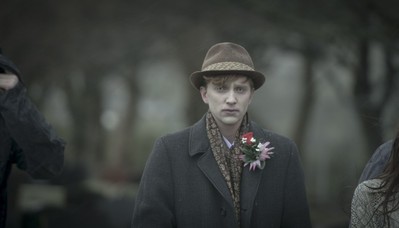
Yeah, there are some really good people in Roarton as well, they’re not all like Mrs Lamb. There’s Shirley, Sue and Steve, there’s a lot of characters who are good and positive in that community. Unfortunately the loudest voices are usually the most extreme, and that’s what you hear. Kieren himself, he was born, bred and died in Roarton. He’s from Roarton as much as Bill is from Roarton.
It does seem very timely to present a party like Victus given the rise of right-wing parties like UKIP in politics.
We wrote these scripts about a year ago so I couldn’t tell what was going to happen in the future. But In the Flesh is a more reality-based version of the zombie genre, so I always thought there was going to be a backlash to the government’s decision to send the PDS sufferers back. A lot of stuff that happened in the first series with Bill and Rick and Ken happened all over the country. There’s a big backlash from the living saying “no-one is representing us.” And when someone says that, that’s when far-right extreme groups get their backing, and Victus was born out of that. It’s a one-issue party, we are about the living’s rights, and that’s it. Maxine doesn’t have a lot of other policies except PDS sufferers should be segregated. Their policies aren’t far-reaching, but it’s enough to get her elected because the country’s in a state of fear. You can’t help but take inspiration from things that are happening in the world around you. It’s not solely about BNP or UKIP or any of those parties, because you don’t want to say “Victus is the evil party based on them.” But it’s just based on those kind of one-issue parties, like the Tea Party is a one-issue party who believes in one thing.
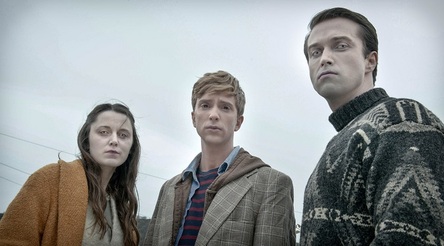
I went to the Surrey Institute of Art & Design, which is now the University College of Art & Design. I studied Film Production, so I wrote a lot of screenplays, a lot of bad screenplays, and directed a lot of not-so-great short films. When I graduated, I couldn’t get a job, and I happened upon the Royal Court Young Writer’s Scheme, which was for Theatre, and I went on that, as well as the Soho Young Writer’s Scheme. In the Flesh began on a BBC Young Writer’s Scheme, so what I’d say to all new writers is get on those schemes. They may not pay anything, or pay a miniscule amount, but they’re so important because you’re with your peers, who all want to do the same thing, which is important because writing is a lonely profession, you against the world. But when you’re on a scheme, you feel like you’re not a freak, this is a profession, and it’s a noble profession. Being around other people is great. And you’re mentored by some really experienced writers. I was mentored by John Fay, who has written on numerous shows like Torchwood, and he was a core writer for Coronation Street. He was so important to me when I was on the Northern Voices scheme doing the first draft of In the Flesh. It was great to have him read it through and support it. That’s what all young writers need. So I would say go on schemes. Go on the BBC Writer’s Room website; go on the BAFTA website because they do a lot of schemes. Keep applying for them. I applied numerous times and got rejected before I got on them, so have perseverance. Write as well, and it’s alright to be crap. A lot of my first drafts are bad. As a writer, you have to come to terms with that and think “my first draft of this episode isn’t going to be great.” But no-one’s going to shoot it and only a couple of people are going to look at it, and that’s quite liberating to know that you don’t have to be perfect. The pilot episode of In the Flesh went through about 20 drafts before it got on screen.
I went on a BBC Writer’s Room Scheme called Northern Voices, and I did a one-page pitch of this zombie show, which wasn’t called In the Flesh at that time, it was called The Reanimation of Kieren Walker. I also sent them some of my plays because I’d never done a TV script before, and they said “great, we like the idea, we really like your writing. Come on this 12-month scheme, with three other really good unproduced writers.” It was fantastic because they wanted you to write in your own voice. They told us, “look, these aren’t going to get made, there’s a very slim chance that people are even going to read them.” That again was quite liberating, so I thought I’d write what I was really interested in, and what I really want to see on TV. That’s another big tip, write what you want to see on TV, not what commissioners or other people want to see, and then you’ll always write with passion. I’m not gonna be writing the next period drama because I don’t watch them, but I do watch zombie films. I wrote that in a year, and they sent the scripts off to BBC Drama North, and Simon Judd, who was the Script Editor at the time, read The Reanimation of Kieren Walker and he really liked it and optioned it. We worked together on a few more drafts, then I did a series bible, and from that series bible I got a commission. It was a massive 100-page behemoth. I’m not suggesting everyone does that, but for me it was helpful, because I needed to know everything about the show and all the rules of the show and all the backstory. So that’s how In the Flesh came about.

What was your favourite part of the series?
Would you like a third?
Let us know in the comments!

 RSS Feed
RSS Feed
